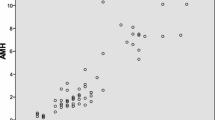Abstract
Purpose
To compare the presence in levels of antiovarian antibodies (AOAb) in the pre- and postovulatory stage from serum of infertile patients undergoing intrauterine insemination (IUI) or in vitrofertilization (IVF) with outcome of the procedures.
Results
Serum from 36 women undergoing IUI, 36 women undergoing IVF and 25 fertile, healthy controls were assayed for the presence of AQAb by a commercially available ELIS A kit. AOAb was positive in 59.7% of infertile women, while none of the fertile controls were positive for AOAb. The levels of these antibodies increased as the patient age and the number of treatment attempts increased. Though the presence of AOAb did not affect oocyte recovery rate, it resulted in decreased fertilization rate, cleavage rate, and pregnancy rate in infertile women.
Conclusions
Our studies suggest that AOAb may be a cause of infertility and presence of these antibodies could have adverse effects on the outcome of assisted reproductive techniques.
Similar content being viewed by others
References
Shibahara H, Burkman IJ, Isojima S, Alexander NJ: Effects of sperm immobilizing antibodies on sperm-zona pellucida tight binding. Fertil Steril 1993;60:533–539
Moncayo-Nevada H, Moncayo R, Benz R, Rer. Nat, Wolf A, Lauritzen Ch: Organ-specific antibodies against ovaries in patients with systemic lupus erythematosus. Am J Obstet Gynecol 1989;160:1227–1229
De Moraes Ruehsen M, Blizzard RM, Garcia-Bunnel R, Jones GS: Autoimmunity and ovarian failure. Am J Obstet Gynecol 1972;112:693–703
Coulam CB, Kempers RD, Randall RV: Premature ovarian failure: evidence for the autoimmune mechanism. Fertil Steril 1981;36:238–240
Luborsky JL, Visintin I, Boyers S, Asari T, Caldwell B, De Cherny A: Ovarian antibodies detected by immobilized antigen immunoassay in patients with premature ovarian failure. J Clin Endocrinol Metab 1990:70:69–75
Damewood MD, Zacur HA, Hoffman GJ, Rock JA: Circulating antiovarian antibodies in premature ovarian failure. Obstet Gynecol 1986;68:850–854
Irvine WJ, Chan MMW, Scarth K, Kolb FO, Hartog M, Balyss RIS, Drury MI: Immunological aspects of premature ovarian failure associated with idiopathic Addison's disease. Lancet 1967:2:883–884
Ahonen P, Miettinen A, Perheentupa J: Adrenal and steroidal cell antibodies in patients with autoimmune polyglandular disease type I and risk of adrenocortical and ovarian failure. J Clin Endocrinol Metab 1987;64:494–498
Confino E, Harlow L, Gleicher N: Peritoneal fluid and serum antibody levels in patients with endometriosis. Fertil Steril 1990:53:242–245
Mathur S, Peress MR, Williamson HO, Youmans CD, Maney SA, Garvin AJ, Rust PF, Fudenberg HH: Autoimmunity to endometrium and ovary in endometriosis. Clin Exp Immunol 1982;50:259–266
Moncayo H, Moncayo R, Benz R, Wolf A, Lauritzen Ch: Ovarian failure and autoimmunity: Detection of autoantibodies directed against both the unoccupied leutinizing hormone/human chorionic gonadotropin receptor and the hormone receptor complex of bovine corpus luteum. J Clin Invest 1989:84:1857–1865
Veeck LL: Atlas of the human oocyte and early conceptus, CL Brown (ed). Baltimore, Williams and Wilkins, pp 5–139
Mignot MH, Drexhage HA, Kliengold M, Van de Plassche-Boers FM, Ramanth Rao B, Shoemaker J: Premature ovarian failure. II: Consideration of cellular immunity defects. Eur J Obstet Gynecol Reprod Biol 1989;30:67–82
Moncayo R, Moncayo H, Dupont O: Immunological risks of IVF. Lancet 1990;335:180
Barbarino-Monnier P, Gobert B, Giullet-Rosso F, Béné MC, Laudes P, Faure G: Antiovarian antibodies, repeated attempts and outcome of in vitro fertilization. Fertil Steril 1991:56:928–932
Gobert B, Barbarino-Monnier P, Giullet-May F, Béné MC, Faure G: Antiovarian antibodies after attempts at human in vitro fertilization induced by follicular puncture rather than hormonal stimulation. J Reprod Fertil 1992;96:213–218
Jenkins JM, Wheatcroft N, Arthur I, Astori K, Masson G, Cooke I, Wheetman T: Ovarian antibodies may not have adverse influence on the response to gonadotropin stimulation preceding IVF. Hum Reprod 1994;9 (Suppl 3) Abs FC17, pp 13–14
Moncayo R, Moncayo HE: A new endocrinological and immunological syndrome in systemic lupus erythematosus: elevation of human chorionic gonadotropins and antibodies directed against ovary and endometrial antigens. Lupus 1995:7:39–45
Author information
Authors and Affiliations
Rights and permissions
About this article
Cite this article
Narayanan, M., Murthy, P.S.R., Munaf, S.A. et al. Antiovarian antibodies and their effect on the outcome of assisted reproduction. J Assist Reprod Genet 12, 599–605 (1995). https://doi.org/10.1007/BF02212582
Received:
Accepted:
Issue Date:
DOI: https://doi.org/10.1007/BF02212582




